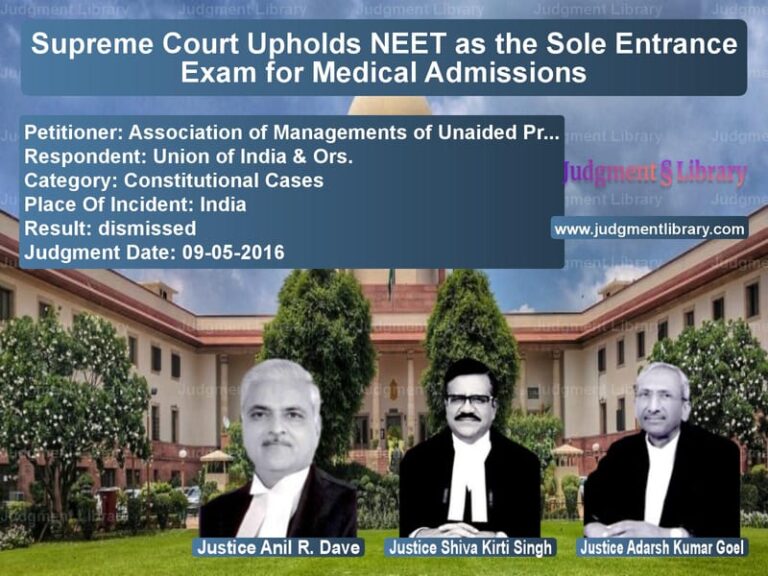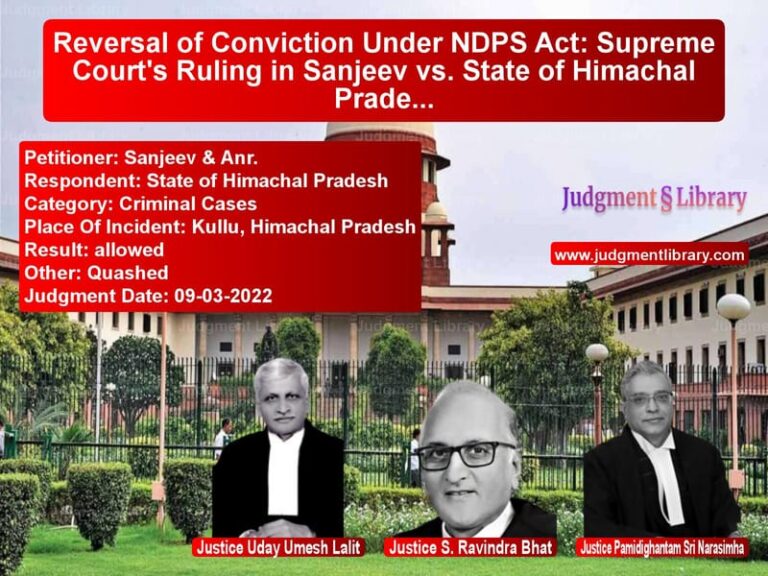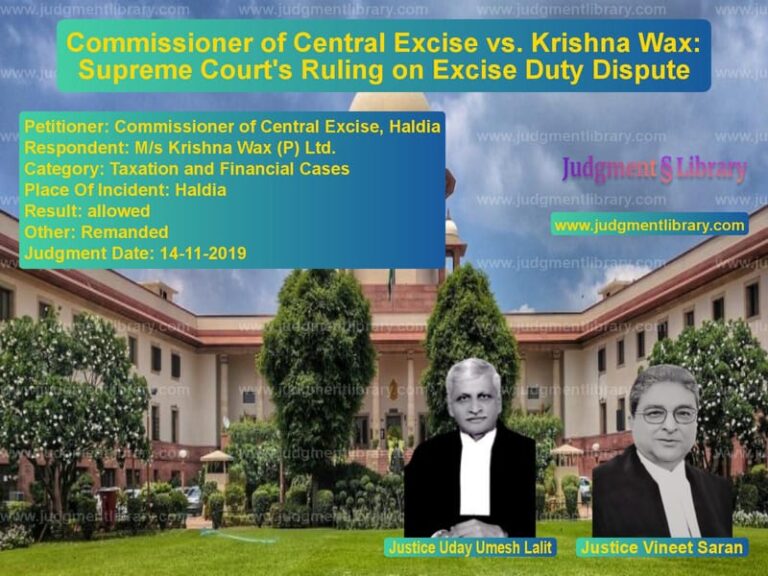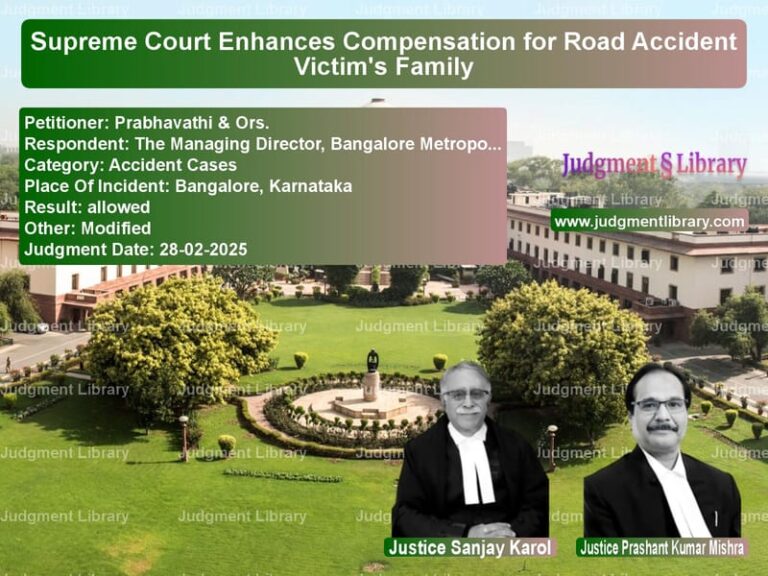Union of India v. Mrityunjay Kumar Singh: Supreme Court Upholds Bail in NIA Case
The Supreme Court of India recently ruled in the case of Union of India v. Mrityunjay Kumar Singh, where the Union of India challenged the grant of bail to the respondent in a case involving charges under the Unlawful Activities (Prevention) Act (UAPA), Indian Penal Code (IPC), and Arms Act. The case, which revolved around a deadly attack by the banned CPI (Maoist) organization on police personnel, was investigated by the National Investigation Agency (NIA). The Supreme Court, after careful consideration of the facts and legal principles, upheld the High Court’s decision to grant bail to the accused.
Background of the Case
The case originates from an incident on November 22, 2019, when a patrolling team of the Chandwa Police Station in Jharkhand was ambushed by armed cadres of the CPI (Maoist). The attack led to the death of four police personnel, and their weapons were looted by the assailants. Following this, an FIR (No. 158 of 2019) was registered against 18 named and several unknown persons.
Subsequently, the Central Government directed the NIA to take over the investigation. The FIR was re-registered as RC No. 25 of 2020 under various sections of the IPC, UAPA, and the Arms Act. During the investigation, supplementary charge sheets were filed against 34 individuals, including the respondent, Mrityunjay Kumar Singh, who was accused of aiding the Maoist insurgents financially and logistically.
Legal Charges Against the Respondent
The charges against the respondent included serious offenses under multiple legal provisions:
- Indian Penal Code (IPC): Sections 120(B), 121, 121(A), 122, 147, 148, 149, 302, 307, 353, 395, 396, and 427.
- Unlawful Activities (Prevention) Act (UAPA): Sections 10, 13, 16, 17, 18, 20, 21, 38, 39, and 40.
- Arms Act, 1959: Sections 25(1B)(a), 26, 27, and 35.
Trial Court’s Decision and High Court’s Bail Order
The respondent initially applied for bail before the Special NIA Judge, Ranchi, who rejected his plea on November 18, 2021. The respondent then filed an appeal before the High Court of Jharkhand, which granted him bail on January 30, 2023, imposing certain conditions. The Union of India, dissatisfied with the High Court’s decision, appealed before the Supreme Court seeking cancellation of bail.
Arguments by the Union of India
The Additional Solicitor General of India, Shri K.M. Nataraj, appeared for the Union of India and presented the following arguments:
- The respondent was closely associated with Regional Commander of CPI (Maoist), Ravindra Ganjhu, and provided financial and logistical support to the organization.
- A search at the respondent’s residence led to the recovery of unaccounted cash amounting to Rs. 2.64 crores, for which no plausible explanation was provided.
- The respondent had previous criminal antecedents, being involved in three other cases, and was allegedly threatening witnesses in an attempt to obstruct justice.
- There was a high likelihood that the respondent, if released, would influence witnesses and tamper with evidence.
Arguments by the Respondent
Senior Advocate Siddharth Luthra represented the respondent and argued in favor of upholding the bail order. He presented the following counterarguments:
- The High Court had thoroughly examined the evidence and found that the respondent’s name did not appear in the initial FIR or in the statements of key witnesses.
- The prosecution’s claim of financial transactions supporting Maoist activities was speculative and unsubstantiated.
- The cases cited by the prosecution to establish criminal antecedents were either disposed of in favor of the respondent or involved bail grants.
- The respondent had been on bail for over 15 months without any reported violations of bail conditions.
Supreme Court’s Observations
The Supreme Court analyzed the legal principles surrounding bail in serious criminal cases and cited previous landmark rulings:
- In Vaman Narain Ghiya v. State of Rajasthan (2009) 2 SCC 281, it was held that an accused cannot be detained solely based on presumed guilt.
- In NIA v. Zahoor Ahmad Shah Watali (2019) 5 SCC 1, the Court emphasized that bail can only be denied if there are reasonable grounds to believe that the accusations are prima facie true.
- In Ranjitsing Brahmajeetsing Sharma v. State of Maharashtra (2005) 5 SCC 294, it was ruled that bail should not be denied merely based on the prosecution’s allegations unless strong supporting evidence exists.
Applying these principles, the Supreme Court noted:
- The respondent had been granted bail by the High Court after proper judicial scrutiny.
- No substantial evidence had emerged to prove that the respondent violated bail conditions.
- The Union of India had not sought bail cancellation at the High Court level before approaching the Supreme Court.
- The prosecution’s claims of witness intimidation were not corroborated with sufficient evidence.
Final Judgment
The Supreme Court dismissed the appeal filed by the Union of India, upholding the bail order granted by the High Court. However, the Court allowed the prosecution to seek bail cancellation in the future if the respondent was found violating bail conditions.
Conclusion
The judgment in Union of India v. Mrityunjay Kumar Singh reinforces the principles of bail jurisprudence in India. It highlights the importance of judicial scrutiny in balancing national security concerns with individual liberty. The ruling underscores that an accused cannot be detained indefinitely unless strong evidence establishes guilt beyond reasonable doubt. This decision sets a precedent for future cases under UAPA and related statutes.
Petitioner Name: Union of India.Respondent Name: Mrityunjay Kumar Singh.Judgment By: Justice Pamidighantam Sri Narasimha, Justice Aravind Kumar.Place Of Incident: Chandwa, Jharkhand.Judgment Date: 10-05-2024.
Don’t miss out on the full details! Download the complete judgment in PDF format below and gain valuable insights instantly!
Download Judgment: union-of-india-vs-mrityunjay-kumar-sin-supreme-court-of-india-judgment-dated-10-05-2024.pdf
Directly Download Judgment: Directly download this Judgment
See all petitions in Terrorist Activities
See all petitions in Bail and Anticipatory Bail
See all petitions in Custodial Deaths and Police Misconduct
See all petitions in Attempt to Murder Cases
See all petitions in SC/ST Act Case
See all petitions in Judgment by P.S. Narasimha
See all petitions in Judgment by Aravind Kumar
See all petitions in dismissed
See all petitions in supreme court of India judgments May 2024
See all petitions in 2024 judgments
See all posts in Criminal Cases Category
See all allowed petitions in Criminal Cases Category
See all Dismissed petitions in Criminal Cases Category
See all partially allowed petitions in Criminal Cases Category







